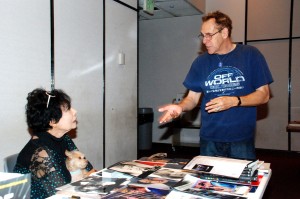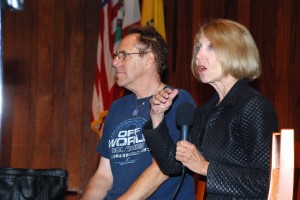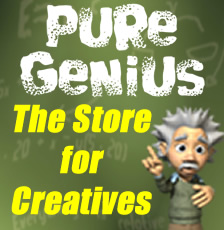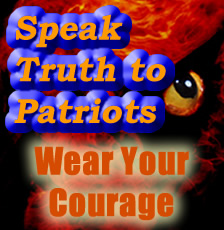Alameda Writers Group: Kickstarting Your Film
(Originally published on Blogcritics.org)
“What the suits want isn’t always the same as what the fans want,” explained screenwriter and author Marc Zicree at the October meeting of the Los Angeles based Alameda Writers Group (AWG). Zicree and his wife Elaine spoke to over 100 writers at AWG’s monthly meeting about non-traditional ways of getting published and making movies.
The Zicree’s work has been purchased by nearly every major network and studio, with hundreds of hours of credits on shows such as Star Trek – The Next Generation, Deep Space Nine, Friday The 13th – The Series, Babylon 5, Smurfs, He-Man, Superfriends, Real Ghostbusters and Sliders. Their work has been nominated for the Humanitas Prize, Hugo, Nebula, Diane Thomas and American Book awards and has won the TV Guide Award, Rondo Award and Saturn Award. Marc is also author of the Twilight Zone Companion book and the Magic Time trilogy of novels.
The Zicree’s are currently writing, directing and producing Space Command, a series of science fiction films with some of the entertainment industries top actors, a project which they funded through the online funding site, Kickstarter.
With so many credits and industry connections, why would they choose to fund their latest project via Kickstarter? On Kickstarter, pomoters raise money by promising fans of their projects various benefits such as t-shirts, DVDs and screen credits in return for donations.
Marc explained that it was a matter of creative control. “Once you sell something to a studio,” he said, “they own it, whether it ever gets made or not.” He continued, “I’m not interested in writing things that just go into development. I’m interested in writing scripts that get made into movies.”
He cited another example of a friend of his who struggled with Hollywood’s inability to share his vision of the story he wanted to tell. “He fought the system for years,” Marc said. “Then he finally got frustrated, went off to live in Arizona and write his epic, expansive stories as a series of novels.” Smiling, he explained, “Eventually the novels were pitched in Hollywood as The Sopranos meets Lord of the Rings. Yes, you guessed it: Game of Thrones.”

Marc Zicree speaks with actress Arlene Martel, famous among Star Trek fans for playing Spock’s Vulcan bride.
On the other end of the spectrum from Kickstrarter, Elaine Zicree stressed the importance of building personal relationships. “That letter you may have spent a week polishing to send out to studios to pitch your script may go directly into a shredder without anyone reading it,” she said. “The studios get thousands of letters like that. Show what you can do with small projects and meet other people who also want to make films. People want to work with other talented people.”
Another way of meeting people who can give you good advice, according to Marc, is at events like the annual American Film Market in Santa Monica. “You can walk around certain floors for free and talk to distributers. They’ll tell you if your project is saleable and if there’s a problem, what it is.”
One of the AWG members asked the Zicrees about some of the budget and tax implications of funding a project through Kickstarter. Marc gave the example of a film you think should cost $200,000 to make. “Set your Kickstarter goal at $250,000. Kickstarter gets 10 percent off the top,” he explained. “Then you’ve got to budget for the premiums – t-shirts, parties, DVDs and postage to deliver them – that you promised your supporters.” Elaine added that you need to remember that the Kickstarter donations count as regular income. “You need to plan on taxes,” she said, “and an LLC is a good idea.”
The next meeting of the Alameda Writers Group will take place November 2, 2013, at the Glendale Central Library, and is free to the public.



